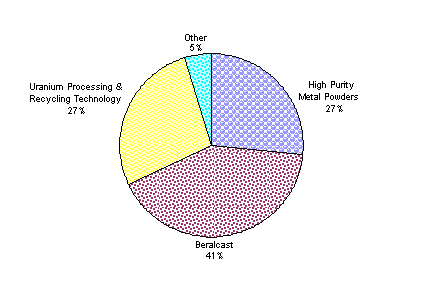![]()

Providing tomorrow's solutions today
To keep Starmet on the leading edge in providing engineering solutions for today's metallurgical challenges, we are committed to continuing our M.I.T. tradition of a strong and well funded research and development organization.
Research and development activities at Starmet Corporation are carried out by more than twenty engineers and scientists located at our Concord, Massachusetts and Barnwell, South Carolina facilities. Our technical staff members have backgrounds in the fields of metallurgy, materials science, ceramics, chemistry, and mechanical engineering, including seven with Ph.Ds. We work closely with our customers to define upcoming needs and focus our research activities. We also welcome opportunities to participate in co-development programs with our customers.
Research and development programs at Starmet have two distinct functions:
- Pioneering efforts to develop new products/processes/applications
- Improvements to existing products and processes.
Starmet Internal R&D Spending FY'98
Our Beralcast® investment casting business is based on beryllium aluminum alloys and processes developed by Starmet R&D in conjunction with Lockheed Martin Corporation. The Beralcast® alloys are covered by three Starmet patents. We continue to develop new beryllium aluminum alloys with properties tailored to specific applications, including golf club shafts and disk drive arms. We are also working to continuously improve the quality and cost of our present Beralcast® products.
Bringing Forth Cost Effective Innovation We currently have a major development effort for deconversion processing of depleted uranium tetrafluoride (DUF4). Advanced recycling technology processes are being developed to economically produce uranium oxide and recover fluorine from DUF4. By-products of the deconversion process are high value fluorine compounds and anhydrous HF. These fluorine compounds can be used directly, as fluorinating agents in the manufacture of organic and inorganic chemicals, or as precursor compounds in the manufacture of advanced non-oxide based ceramics. The high quality depleted uranium oxide from this new process can be used to manufacture uranium products such as depleted uranium aggregate for DUCRETE™ Shielding. DUCRETE™ Shielding is a high density concrete suitable for radiation shielding applications.
Efforts in the high purity metal powders area have two major thrusts. New methods have been developed to produce finer powders than could traditionally be produced by Plasma Rotating Electrode Process (PREP®). Finer powders are required for certain methods of part production, including metal injection molding (MIM). We are also developing low cost titanium powder consolidation processes for near net shape production of titanium parts.Our staff of Ph.D. metallurgists are working today on tomorrow's challenges for new materials and processes. Through cooperative efforts with the Department of Energy, commercial enterprises, and university research centers we will ensure that Starmet's future and yours, is a bright one.








